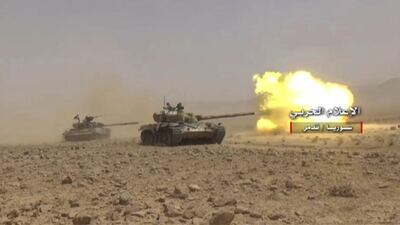BEIRUT // ISIL no longer has a presence in Syria’s Aleppo province after withdrawing from a series of villages where regime forces were advancing.
“ISIL withdrew from 17 towns and villages and is now effectively outside of Aleppo province after having a presence there for four years,” said Rami Abdel Rahman, head of the UK-based war monitoring service, the Syrian Observatory for Human Rights.
Regime forces had been advancing on a sliver of southeastern Aleppo province around a key motorway linking Hama province to the south-west and Raqqa province further east. But Syrian government forces seized control of the road late on Thursday night, prompting the remaining ISIL fighters to flee. A Syrian military source in rural Aleppo confirmed the withdrawal, saying the Syrian army was “ clearing out the last few metres.” .
Since early 2015, multi-front offensives have eaten away at territory ISIL held in Aleppo province. US-backed Kurdish and allied Arab fighters drove the extremists out of Kobane on the Turkish border in 2015 and from the key city of Manbij last year. Rebel fighters backed by Turkey seized the town of Al Bab in February and Syrian government troops have steadily chipped away at ISIL-held towns in the south of the province.
In neighbouring Raqqa province, a US-backed offensive is bearing down on the provincial capital of the same name, which has served as the jihadists’ so-called capital in Syria.. However, the Syrian Observatory said ISIL recaptured an eastern district of Raqqa on Friday. The day before, dozens of militants disguised in SDF uniforms launched an attack on Al-Senaa from the city centre, carrying out three suicide car bomb attacks and overrunning six SDF positions.
By Friday, the SDF and its allies withdrew from Al-Senaa to the adjacent neighbourhood of Al-Meshleb.
“IS fully retook Al Senaa, which was the most important neighbourhood taken by the Syrian Democratic Forces,” Mr Rahman said.
The densely built-up neighbourhood was the closest that the SDF and allied Arab fighters known as the Elite Forces had come to the city centre.
In Geneva, the United Nations refugee agency on Friday said nearly half a million displaced Syrians have returned to their homes since the beginning of the year. Since January, about 440,000 people displaced by the war have returned mainly in Aleppo, Hama, Homs and Damascus. About 31,000 refugees in neighbouring countries had also returned, the UNHCR said, bringing to 260,000 the number of refugees who have returned to the country since 2015. But the numbers constitute “a fraction” of the five million Syrian refugees in the region.
A UNHCR spokesman said the main reasons for returning were “seeking out family members, checking on property, and, in some cases, a real or perceived improvement in security conditions in parts of the country.”
Though the UNHCR believes conditions for refugees to return in safety and dignity are not yet in place, the agency has begun scaling up ts operations inside Syria to better be able address the needs of the returnees.
* Agence France-Presse

